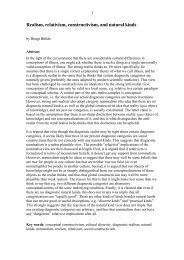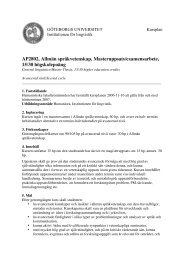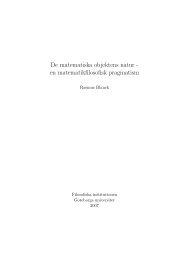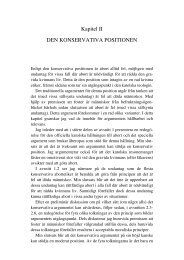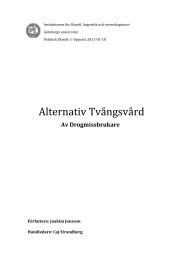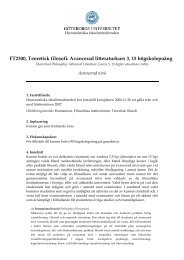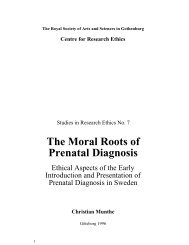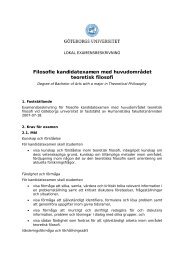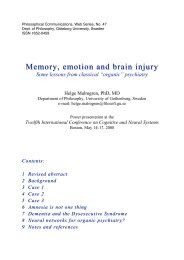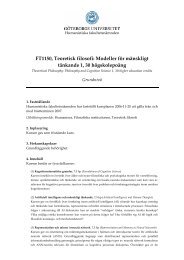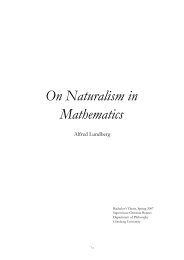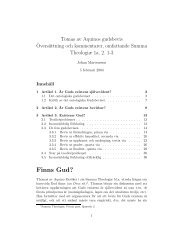Moral Relativism
Moral Relativism
Moral Relativism
- No tags were found...
You also want an ePaper? Increase the reach of your titles
YUMPU automatically turns print PDFs into web optimized ePapers that Google loves.
4the concepts in making judgements. Often, making such judgements will proceed via aposteriori means, e.g. the thinker uses his/her experience (or other a posteriorijudgements) to employ a concept. However, knowledge of constitutive rules can also giverise to a priori knowledge: a speaker will sometimes be able to arrive at a judgement bymerely exercising the abilities they have acquired in the process of learning the conceptsinvolved and therefore not relying on experience.Some clarification and qualification is clearly needed at this point. First, being acompetent thinker is not an all or nothing affair. From early childhood onwards we allgradually add more and more concepts or other tools of thought to our repertoires. Theprocess is particularly fast during a genetically programmed learning phase in earlychildhood. It makes sense to speak of a “mature thinker” when that phase has beencompleted. But it is neither easy to pinpoint the precise end of that process, nor is it easy(or possible) to spell out the exact conceptual range that an individual would need tomaster in order to count as a competent thinker. For example, while it seems obvious thatthe concept “sleep” is so basic that every competent thinker needs to master it, it is lessclear whether every competent thinker grasps the concept of a frisbee, or of marmalade.But a competent thinker will be familiar with a critical mass of those concepts that areused in the community (or communities) of which he or she is a member. Secondly, thereliability and speed with which any given thinker can employ the concepts with whichhe or she is competent can vary. Thirdly, it may not always be clear mastery of whichprecise rules is necessary for competence with a concept. It may or may not be necessaryfor possession of the concept of arthritis that one know that arthritis cannot occur inanyone’s thigh. (By contrast, knowledge that arthritis is a disease is presumablyrequired.) I suspect that any concept can be mastered to varying degrees and that somethinkers, experts, have a socially privileged role in determining what is or is not regardedas constitutive of a concept. Because of the outstanding role of some experts, not everyuser of a given concept needs to be au fait with all the constitutive norms governing thatconcept. Some norms are not known by some of the users that are subject to them.Fourth, none of the above commits me to essentialism: it may be illuminating to viewconcepts as being governed by constitutive norms, but that does not entail that the objectsanswering to the concepts (if any) should be thought of as having some propertiesessentially. Nor am I commited to a conventionalist theory of necessity (see Boghossian1996).Rules constitutive of a concept may not always be expressible or explicable in words.Competence with a word can sometimes be achieved by exposure to examples andsubsequent ability to apply the concept successfully. Thus, I may learn the concept ofarthritis by experiencing what it feels like and a specialist telling me that what I amexperiencing is arthritis. (Some people think that mastery of colour concepts evenrequires experiential familiarity with colours, i.e. those who say that blind people don’thave colour concepts. But I prefer to think of colour concepts as public concepts, whichblind people can use, but cannot use in certain ways.)The functioning of a community’s system of thought and communication requiresthat there is a certain systematic convergence in the rules known or mastered bycompetent thinkers. The exact nature and extent of this convergence is too great an issueto settle casually as an aside here. All that is important for my purposes here is that (a)



